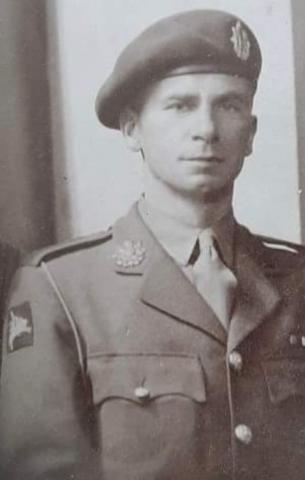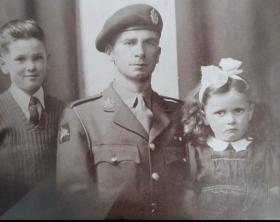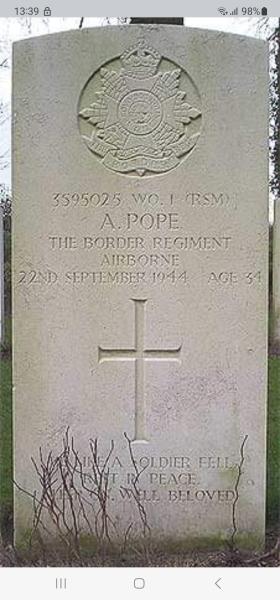Warrant Officer 1 Albert Pope from the Border Regiment. Albert was the Regimental Sergeant Major (RSM) of the Battalion and so the senior NCO in the Battalion and responsible to the CO for discipline amongst the men. He was called Sir by the men as befitted his rank and also this or Mr Pope by the officers. He obviously called the officers Sir but as many an RSM has said to officers in training ‘You call me Sir and I call you Sir but we both know who really means it!’ So Albert was born in Bolton around 1910 and so at the age of 34 in September 1944 he was the RSM of the 1st Borders, his Army number was 3595025 which puts him in the block of numbers allocated to this Battalion and it is believed he joined them in October 1927. Twelve years later when the Second World War broke out in 1939 he was the Drum Major in the Battalion and went over to France as part of the British Expeditionary Force. Albert or ‘Bish’ as he was nick named was one of the lucky ones to make it back from Dunkirk. He remained with the 1st Battalion when it converted to an airborne role and took part in the Sicily glider invasion in July 1943. But before this in July 1942 he had attended and passed a parachute course at RAF Ringway so one of the few Border Regiment men to be able to parachute. Indeed only around 30 men were in this category.
By July 1943 he was a Warrant Officer Class II and a Company Sergeant Major. His glider was one of those that landed in the sea but was rescued. The following is taken from When Dragons Flew:
In many cases discipline prevailed even in the most trying of circumstances. CSM Albert 'Bish' Pope landed in the sea and ordered the 12 men in his glider to retain their positions. When they were picked up by landing-craft on the morning of 10th July, Pope stood to attention in 4 feet of water, saluted the officer and reported his party present and correct before allowing them to enter the vessel. The RSM of the Battalion WO1 G Gardner was killed on the Sicily operation so Bish was promoted to WO1 and assumed the position of RSM. He served in Italy in 1943 before the Battalion returned to England. At some point Bish also attended a parachute course at RAF Ringway
For Operation Market Garden the Border Regiment had been given security duties to guard Landing Zones for the second lift and after this moved to form part of the planned Divisional perimeter and so were in western Oosterbeek by the 19th September.
Here he remained no doubt close to Battalion HQ and encouraging the men in their defensive positions. Then on the 22nd September 1944 the incident occurred which was to end his life; this again is taken from When Dragons Flew:
Friday, 22 September. The night was reasonably quiet, but as usual in the early morning the enemy heavily mortared and shelled the battalion area. At about 09.00 hrs the battalion ammunition dump received a direct hit, which did considerable damage in the area and destroyed all but two of the remaining serviceable battalion vehicles. The explosion caused a fire, which set ammunition exploding in all directions, yet RSM 'Bish' Pope and CSM Fielding and a party of men managed to salvage mortar bombs and .303 inch ammunition before the fire reached the plastic high explosive. Everyone managed to reach cover before this went up with a deafening roar, the loudest, said Les Fielding, that he had ever heard. Trees within a radius of hundreds of yards were stripped of leaves and small branches. The fire caused by the explosion became the registration point for the enemy mortars, so any movement from the slit trenches would result in casualties. It was during this incident that RSM Pope, who had served with the Regiment since 1927, was fatally wounded. He was taken to the Regimental Aid Post, where, even as he lay dying, he joked with a Medical Orderly about getting his hair cut. He died shortly after, a much respected and well-loved father figure. CSM Les Fielding took over his duties.
The RAP for the Borders was in a house on the Hoofdlaan but possibly as a result of his injuries was taken to the ‘better facilities’ run by 181 Airlanding Field Ambulance a few hundred yards away. Sadly his injuries were not survivable and Bish died on this day. He was first buried in front of the Tafelberg on the Pietersbergseweg. After the war his body was recovered with others from Grid Reference 695778 and reburied on 3rd September 1945 in the Arnhem Oosterbeek CWGC Cemetery. He lies in Plot 22 Row B Grave 13. A native of Bolton he was married to Annie ‘Nancy’ also from Bolton and he left behind two children. The wording chosen by his family for his headstone was He Like A Soldier Fell Rest In Peace Sleep On Well Beloved.
Bish was the only RSM to be killed at Arnhem from the 1st Airborne Division.
Biography written and images supplied by Niall Cherry and Emilie Pope.
Read More



Latest Comments
Add Comment
In order to add comments you must be registered with ParaData.
If you are currently a ParaData member please login.
If you are not currently a ParaData member but wish to get involved please register.